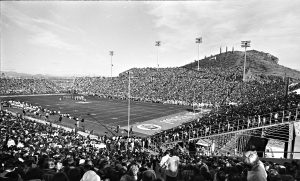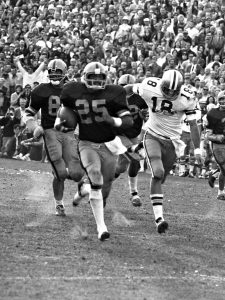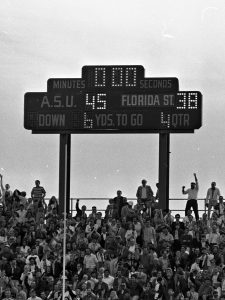- Slug: Sports-1971 Fiesta Bowl, 1,406 words.
- 3 photos available.
By Prince James Story
Cronkite News
PHOENIX – The 1971 sports calendar was a memorable one. The Milwaukee Bucks won their first NBA championship, Muhammad Ali lost to Joe Frazier in a 14-round bout and the Arizona State football team made a historic run.
Many of those players are in Tempe this weekend to celebrate the 50th anniversary of the inaugural Fiesta Bowl and will be honored during tonight’s game against Stanford at Sun Devil Stadium.
The Fiesta Bowl was organized by nine prominent members in the Phoenix area because they felt Arizona State was continually snubbed for bowl game invitations, even though they would frequently lose just one or two games each year.
“I think that the first Fiesta Bowl was a huge step forward for the ASU football program. People back east didn’t even know we existed,” said Danny White, ASU’s starting quarterback from 1971-73.
The Sun Devils played most of their games at night, White said, so those on the East Coast were less likely to watch.
From 1969-1971, the Sun Devils recorded a 21-game winning streak and enjoyed a 31-3 record.
As time passes, White realizes how important that era was to players and fans.
“You need to have something in your life that you can remember that you share with a group of people,” White said. “I look forward to this every year.”
He would like to see more events like this promoted because they are special to the players. Mike Tomco, team captain and a senior on the ‘71 team, said the group’s bond is as strong now as it was 50 years ago.
They have an email chain and trade messages almost every day to check-in with each other. During the last 11 years, they have organized regular reunions.
Weekend celebrations started Thursday for the 1971 team at Tempe Mission Palms Hotel.
As past players and their children, spouses, nieces and nephews entered Harry’s Lounge, they greeted each other with smiles, laughter and hugs.
Nicknamed were thrown around, such as “Golden Holden” for Steve Holden. When another player walked in, someone said, “There goes Pinhead” and laughter erupted from a table.
They exchanged jabs like they were 19- and 20-year-olds again back on Arizona State’s campus.
Players from other ASU teams attended the reunion, too, including Dan Kush, the son of late coach Frank Kush. Dan was a kicker on the 1975 team that beat the University of Nebraska in the Fiesta Bowl.
It wasn’t just players who attended the event. An equipment manager was there as well as 97-year-old Larry Kentera, who coached the linebackers and defensive linemen.
“There isn’t anything like being a coach and being around the players that you’ve coached years before … (to) get together when you have a good relationship,” Kentera said. “Greatest feeling as a coach and especially when you were successful. And we were.”
The multicultural group of Black, white, and Asian players all had two things in common: They wanted to win, and they feared Frank Kush.
“In sports, when you know the guy next to you … and you guys are working together and you learn how to have success. It didn’t matter what color you were,” Holden said. “I believe if we did have any type of fight between Black and white, it didn’t last long because we all bleed the same thing. We all understood that we were all Sun Devils. … We all need each other to make it very successful, and I’m very proud to say that I was with three successful seasons at Arizona State.”
Later in the night, they paid homage to the late Bill Kajikawa, the former assistant coach who greeted them before fall camp each year.
As players returned to Tempe from across the country back to the Arizona heat, he would comfort them with the words “just like home.”
That was his way of conveying to them that although they came from different areas and cultures, this football program should feel like a second home.
Even under the watchful eye of Frank Kush.
Under Kush, the Sun Devils were a powerhouse team in the Western Athletic Conference. Kush coached at Arizona State for 22 years and in 19 of them, the Sun Devils had a winning record. They also won the WAC championship seven times.
“The discipline and the intensity of that discipline he put us through gave us a camaraderie because we had to bond together,” said Steve Matlock, an offensive guard from 1970-1973.
Matlock said he started his freshman year with about 45 people on the freshman team. Just eight of the 45 finished together. Some players transferred to a different school to play, and others quit football altogether, he said.
Every season they would spend their fall camp at Camp Tontozona.
Teams practicing twice a day during their preseason is common today, but the Sun Devils weren’t normal under Kush. He had a different method.
At camp, they practiced for 11 days, three times a day.
Matlock joked that when you left camp, you were either in a body bag covered in ice or ready to play.
One of Kush’s best-known drills used to discipline players for mental mistakes was the hamburger drill.
Specific groups had hamburger drills tailor-made for them. As an offensive lineman, Matlock would have to hold the ball over his head. Meanwhile, defensive players would line up across the field and then hit him at full force.
Holden, who was the return man and wide receiver from 1970-1972, said he only had to do hamburger drills once because he kept dropping the ball. After that, he made sure he never had to do them again.
“One, I was scared. Two, I didn’t want to get hit, and three I didn’t like getting dirty,” he said. “Those three things don’t go well with being a football player. If I caught the ball, and if I didn’t get tackled, I didn’t get dirty. So I scored a lot of touchdowns.”
At the beginning of one camp, Kush put White in as quarterback with the first team. Grady Hurst, who was the starting quarterback at the time and was frustrated with the move, quit the team.
White grew up in Mesa, the son of Wilford “Whizzer” White, who was ASU’s first football All-American.
Danny originally came to ASU on a baseball scholarship.
“For me to walk out on that field, under the lights against the University of Houston as the starting quarterback was … in my wildest dreams,” White said. “I never thought I would play football for ASU. I was a baseball player.”
“I remember Kush coming out before the game, and he came over to me, and he’s ‘Aye White, you look nervous.’ I said, ‘Well, coach, to be honest with you. I’m a little nervous.’ And he said, ‘Ah hell.’ He said, ‘There are 11 guys out there, and 10 of them are better runners than you are. So just get the ball from the center and give it to the right guy without dropping it and we’ll be fine.”
That was the pep talk Kush gave to the sophomore quarterback, but it worked. ASU beat the University of Houston in the season opener 18-17.
The Sun Devils’ only loss in ‘71 came against Oregon State. White didn’t play because he had a separated shoulder, so the team brought back Hurst, who started.
The team went on to play Florida State in the first-ever Fiesta Bowl in 1971. The game was back and forth. Both offenses put up impressive numbers.
Garry Huff, the quarterback for the Florida State team, completed 25 for 46 passes for 347 yards, and added a pair of touchdown passes. Huff went up to win MVP even though Florida State lost the game.
The Sun Devils that shined were running back Woody Green, who rushed for 101 yards and three touchdowns. Holden had a 58-yard punt return for a touchdown and a 66-yard receiving touchdown.
Green scored the go-ahead touchdown from the two-yard line with a few seconds left on the clock to put ASU ahead 45-38.
This weekend is a chance for players to reunite, tell old stories about teammates and surviving Kush, and be around family and pay homage to the men who are still here and those who have passed away.
Fifty years later, they can continue celebrating their success and enjoy their time at a place they can always call home.
For more stories from Cronkite News, visit cronkitenews.azpbs.org.


